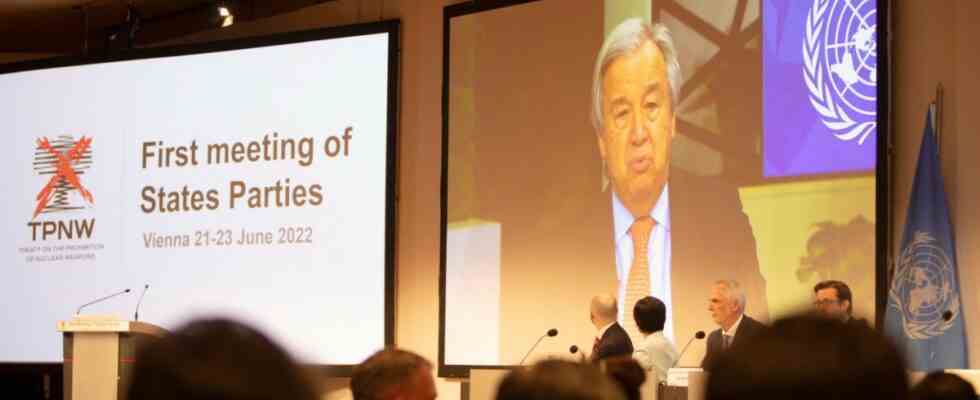At the beginning of the year it still looked as if something might be moving on the subject of nuclear disarmament. The five official nuclear powers, who are also permanent members of the UN Security Council, release a joint declaration in which they affirmed that a nuclear war must never be waged and cannot be won. The United States and Russia had already extended the New Start treaty to limit strategic nuclear weapons the year before and started talks with which they wanted to explore the possibilities for a new arms control agreement. Little of this has remained since the Russian attack on Ukraine.
Against the background of explicit threats by Russian President Vladimir Putin to use them against his opponents, more than 80 countries had to hold a conference in Vienna on Thursday to abolish and ban all nuclear weapons. However, the war against Ukraine was also not the focus of the first meeting of those states who have signed the Nuclear Weapons Prohibition Treaty (TPNW).such as the slowly escalating nuclear crisis with Iran or North Korea’s preparations, which point to an imminent nuclear test.
At the beginning, UN Secretary-General António Guterres warned in a video message that the 13,000 warheads worldwide were a recipe for the possible destruction of the planet in a world full of conflict and mistrust. “We must destroy these weapons before they destroy us,” he demanded. The ban treaty came into force in January 2021, 65 countries have ratified it and 86 states have signed it, mostly from the Global South. Among other things, it prohibits the use, possession and transit, storage and stationing of nuclear weapons.
The federal government is sticking to it: Germany will not sign the treaty
The President of the Committee of the International Red Cross (ICRC), Peter Maurer, described the contract as a “milestone”. It means that nuclear weapons are no longer viewed only from a security policy perspective, but rather their humanitarian impact as a whole is considered, said Maurer. The consequences of nuclear tests for people and the environment took up a lot of space at the conference.
As agreed in the coalition agreement between the SPD, Greens and FDP, the federal government took part as an observer and sent a high-ranking diplomat from the Federal Foreign Office. The traffic light coalition shares the goal of universal nuclear disarmament, but at the same time sticks to nuclear participation in NATO. Chancellor Olaf Scholz (SPD) recently approved the procurement of F-35– Stealth jets from the USA announced, which are outdated in the Bundeswehr tornadoes to replace as nuclear weapon carriers.
The principle of nuclear deterrence has gained considerably in importance again as a result of the Russian attack on Ukraine. In the course of the so-called expanded deterrence, the United States stores a double-digit number of nuclear weapons in Europe, which in an emergency would be dropped by fighter jets from NATO partners such as Germany. However, the authority to command the bombs rests fully with the US President. The NATO states Belgium, Norway and the Netherlands as well as Sweden and Finland, who are striving to join the alliance, were also present as observers.
The members of the ban treaty point out that the official nuclear powers are not fulfilling their nuclear disarmament obligations under the Non-Proliferation Treaty; that is why the ban treaty is necessary. Germany refused to join and sees the blocking treaty as a far more comprehensive agreement as a central pillar of the international order. However, the federal government is trying to develop common ground and perspectives shared by both sides between the states of the ban treaty and those who reject it, for example with a view to the forthcoming review conference on the Non-Proliferation Treaty at the United Nations in New York in August.

